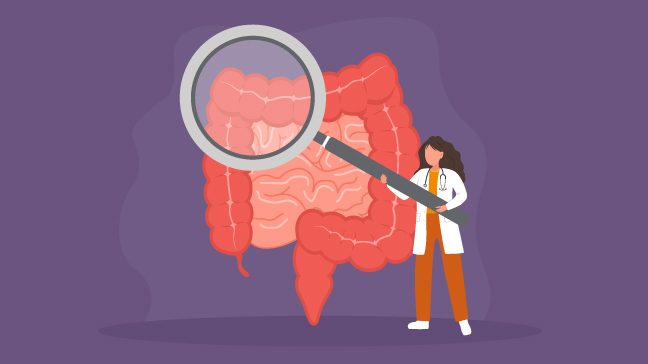request an appointment online.
- Diagnosis & Treatment
- Cancer Types
- Anal Cancer
Learn more about our clinical trials.
View Clinical TrialsMore than 8,000 people in the U.S. are diagnosed with anal cancer each year. Due to higher rates of the human papilloma virus, a key risk factor, it affects women more than men. If found early, the disease can be successfully treated.
More than 8,000 people in the U.S. are diagnosed with anal cancer each year. Due to higher rates of the human papilloma virus, a key risk factor, it affects women more than men. If found early, the disease can be successfully treated.
The anus is about 1-1/2 inches long and connects the rectum (lower part of the large intestine) to the outside of the body. It allows solid waste (also called stool or feces) to pass from the body. The sphincter is two muscles that open and close the anus to let waste pass. The anus is lined with squamous cells, which also are found in the bladder, cervix, vagina, urethra and other places in the body.
Anal Cancer Types
Several types of tumors may be found in the anus. While some of them are malignant (cancer), others are benign (not cancer) or precancerous (may develop into cancer). The main types of anal cancer are:
Carcinoma in situ is early cancer or precancerous cells. They are only on the surface cells of the anal canal. This also may be called Bowen’s disease.
Squamous cell cancer (carcinoma) forms in the cells that line the anus. This is the most common type of anal cancer.
Adenocarcinomas develop in the glands around the anus.
Skin cancers, including basal cell and melanoma, often are found when they are in advanced stages.
Anal Cancer Risk Factors
Anything that increases your chance of getting anal cancer is a risk factor. These include:
- Age: Squamous cell carcinoma of the anus most often is found in people older than 50
- Human papillomavirus (HPV) infection
- Human immunodeficiency virus (HIV) or acquired immunodeficiency syndrome (AIDS)
- Having more than 10 sexual partners
- Anal intercourse
- Frequent anal redness, swelling and soreness
- Tobacco use
- Immunosuppression, including taking immune-suppressing drugs after an organ transplant
Not everyone with risk factors gets anal cancer. However, if you have risk factors, it’s a good idea to discuss them with your doctor.
Anal Cancer Prevention
Certain lifestyle choices can help prevent anal cancer. One of the most important is to avoid HPV infection. Some ways you can lower your chances of getting HPV include:
- Wait until you are older to have sex and limit your number of sexual partners
- Use condoms during sex
- Avoid sex with people with sexually transmitted diseases (STD) or who have had multiple sexual partners
- Don’t smoke or use other types of tobacco
- Get an HPV vaccine. Gardasil® and Cervarix® help protect against certain types of HPV. But if you have HPV, they do not cure it.
Visit our Prevention site to learn more about preventing anal cancer.
Learn more about anal cancer:
Why choose MD Anderson for anal cancer treatment?
MD Anderson’s Colorectal Center treats more patients with anal cancer than most other cancer centers in the nation. This depth of experience enables us to offer you the most accurate diagnosis methods and the latest anal cancer treatments.
Our high level of experience in minimally invasive and sphincter-sparing surgeries and other innovative techniques can help many people with anal cancer. We offer the most advanced therapies for every type of anal cancer, including in people with HIV and AIDS.
Because we know quality of life is important, we make every effort to preserve the sphincter, without affecting control of bowel movements.
As one of the world’s largest cancer research centers, MD Anderson is leading the investigation into new methods of anal cancer diagnosis and treatment. You benefit from the most advanced research and a range of clinical trials of new agents.
And, at MD Anderson you’re surrounded by the strength of one of the nation’s largest and most experienced comprehensive cancer centers. We have all the support and wellness services needed to treat the whole person – not just the disease.
Accept your diagnosis. Reach deep into your soul to make peace with it. Look past your daily reality and imagine a future without cancer.
Pam Patterson
Survivor
Treatment at MD Anderson
Anal cancer is treated in our Gastrointestinal Cancer Center.

Featured Articles
Clinical Trials
MD Anderson patients have access to clinical trials offering promising new treatments that cannot be found anywhere else.
Becoming Our Patient
Get information on patient appointments, insurance and billing, and directions to and around MD Anderson.
myCancerConnection
Talk to someone who shares your cancer diagnosis and be matched with a survivor.
Prevention & Screening
Many cancers can be prevented with lifestyle changes and regular screening.
Counseling
MD Anderson has licensed social workers to help patients and their loved ones cope with cancer.
Help #EndCancer
Give Now
Donate Blood
Our patients depend on blood and platelet donations.
Shop MD Anderson
Show your support for our mission through branded merchandise.








